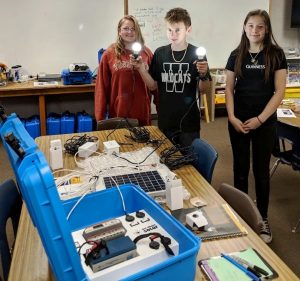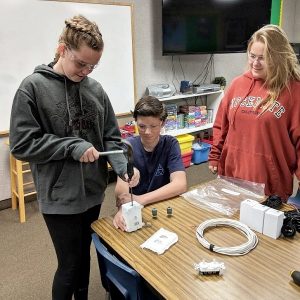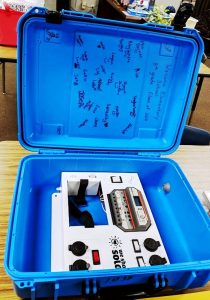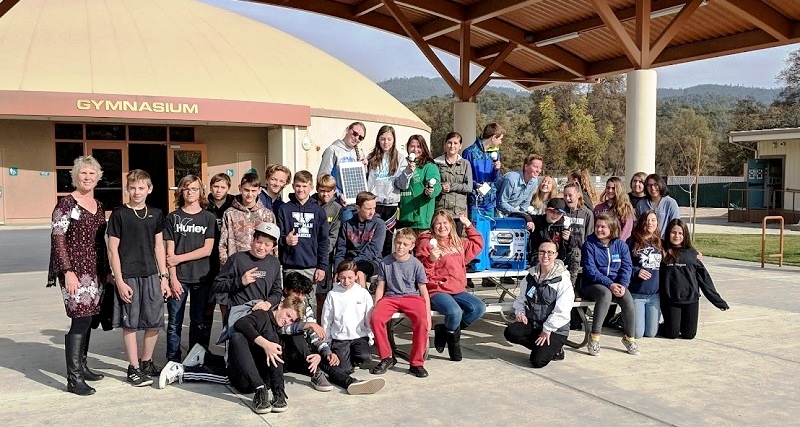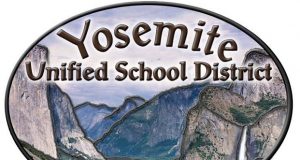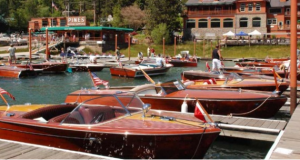AHWAHNEE — A graduating class of local middle school students is anxiously awaiting news that portable solar power units they made themselves are delivered more than nine thousand miles away to kids they haven’t met, but hope to help. They’re excited because they know they’re making a difference.
Eighth graders at Wasuma Elementary School are still talking about the Solar Suitcase project, in which they learned about electricity and solar power and constructed a portable solar system that will help give light to children in Africa.
The non-profit for this project is called We Care Solar and its education partner is We Share Solar. It was originally started to save the lives of mothers and babies.
The idea behind the organization is to provide solar electricity that not only saves lives in hospitals and clinics, but also gives opportunities for children in other countries to receive the education they need to reach their goals in life. They believe in investing in the future by educating our children through hands-on projects and real life situations, showing the students how their efforts are meaningful to others in very important ways.
Kris Barnes is the Instructional Technology Coordinator for Bass Lake Joint Union School District, aka Tech Coach. Her role is to support the teachers and students with all things tech. In doing so, she enlightens small groups of teachers as to what they can do with technology, and support them with any ideas or goals they have involving tech.
Together with Nadine Wright, the 8th grade math and science teacher at Wasuma, Mrs. Barnes co-taught the Solar Suitcase project. Mrs. Wright connected it into her science and math curriculum on electricity, an 8th grade standard for science.
“Nadine and I attended a two-day training with We Care Solar during the summer to learn the curriculum and how to build the suitcase,” explains Mrs. Barnes. “The training was funded by a grant that I applied for last Spring through We Care Solar and PG&E.”
The program was originally started by an OB GYN who traveled to Africa to find out why so many women and children were dying in childbirth, says Mrs. Barnes. The doctor discovered many of the deaths were related to not having electricity.
Sporadic electricity impairs the operation of surgical wards, delivery wards, essential hospital equipment, and hospital communications, according to the organization’s website. This compromises the ability of health workers to provide safe, appropriate and timely medical care. For instance, labor and delivery nurses cannot quickly notify on-call physicians of emergencies. Midwives and physicians are forced to make treatment decisions without the benefit of necessary diagnostic tests.
The doctor described the lack of electricity problem to her engineer husband, and they created a portable solar system to help. Their work has now expanded to bring light to schools, and help low income children have access to light to study for the exams that will allow them to continue their education.
“It was an eye-opening experience to see the challenges students face in other parts of the world,” continues Mrs. Barnes. “The issue that children face in Africa is not having electricity to study at night or charge computers.”
If the students don’t pass certain tests, they’re not allowed to continue their education, she says. These children travel many miles in dangerous conditions to find light to study for their exams.
“Yes, they have candles and oil lamps, but they cost money and also produce toxic fumes. This prohibits many children from getting the education they need to have choices in life and help their families.”
The Wasuma students absolutely loved the assignment, notes their grateful tech coach.
“They enjoyed learning how to create a functioning solar system, and now have a different perspective of what life is like for kids their age in other countries.”
The 2019 Wildcat grads also loved personalizing the suitcase with their signatures and the small notes they penned to their future friends in Africa. They included pictures of themselves and our area, including some postcards of Yosemite. The project was a hit, start to finish.
“The sense of accomplishment when they were able to build, test and use their solar suitcase was great.”
The reasoning behind having students build the solar suitcases instead of adult volunteers is to have a greater impact in the world by educating our youth with a wider global awareness, Mrs. Barnes adds. As a bonus, the project is also a great hands-on STEM project — Science, Technology, Engineering and Math.
Of the two suitcases local youth built, one is now in Sacramento undergoing quality testing to ensure it’s ready to be deployed to Africa this spring, when a We Share Solar team installs it in a school. The other suitcase will be deployed within the United States to help with disaster relief or in an impoverished area. We’ll find out before the end of the school year where that suitcase has gone.
In the meantime, what our kids here need help with now is continuing this project for next year.
“We Care Solar only has the available funds to send us the local deployment suitcase — the USA one — for next year. To help fund an international suitcase we need to raise the funds.”
The current cost for an international suitcase is $2000, shares the educator. Wasuma hopes to expand to include eighth graders at Oak Creek Intermediate, also — meaning an international suitcase for each site for a total cost of $4000 — and that’s what they’re trying to raise.
Anyone interested in helping to support this project may donate to Bass Lake Joint Union School District, and any amount is appreciated. Please note at the bottom of the check “solar suitcases.”
As it turns out, the Solar Suitcase enterprise has been illuminating in unexpecting ways.
“Each student is unique with what they bring to, and take away from, a project like this. It was wonderful to see the sense of pride and increase of confidence in the students as they were able to build a working solar system.
“The best part of this project for me was watching the kindness and willingness to give the children demonstrated – they truly cared for these children they had never met. As one student wrote on their postcard to the students in Africa ‘I believe in you.'”
Nice work, Wasuma! We’ll be back with an update when it’s available. Wasuma Elementary School is part of the Bass Lake Unified School District. For more information contact Mrs. Barnes: kbarnes@basslakesd.org. Photos by Kris Barnes unless otherwise noted.

